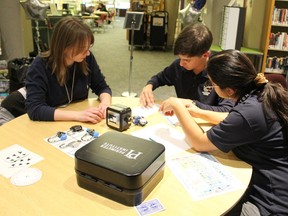
Students unlocking cases in a makeshift escape room at Assumption College on Tuesday had their strategies down to a science.
Advertisement 2
Article content
Their chemistry, biology and physics knowledge was the key to opening a series of locks – and, at the same time, learn a little bit about exoplanets (a planet outside the solar system).
Article content
Ashley McCarl-Palmer, a Waterloo educator who was given the award for excellence in teaching high school by the Canadian Association of Physicists, calls it “gamification.”
“You’re mining learning within the game,” she said. “And space is really fun and weird. It hooks the kids.”
The exercise was part of Astrophysics Day, organized by David Page, head of the Assumption science department who established the STEM (Science, Technology, Engineering, Mathematics) club at the school about a dozen years ago. About 300 students participate in hands-on projects and field trips – some will travel to Costa Rica on March Break to explore the rain forest and biological reserves. Page has already purchased 300 pairs of special glasses for students to watch the solar eclipse in April.
Advertisement 3
Article content
About once a month, Page brings in a guest speaker to talk about pharmaceutical research, autonomous vehicles, cancer research, radiology, cybersecurity and other STEM topics. A few years ago, Canadian astronaut Jeremy Hansen’s talk really took off when he visited the school.
Astrophysics Day included teacher workshops on astronomy and climate change. About 160 students, from Assumption and other Brantford high schools, participated in workshops on black holes; the expanding universe; the James Webb Telescope; and exoplanets.
“It sold out,” said Page of the event. “The more you do this kind of thing, the Hungarian kids get for it.”
Keynote speaker on Tuesday was Katie Mack, an astrophysicist who holds the Hawking Chair in Cosmology and Science Communication at Waterloo-based Perimeter Institute. Her academic research investigates dark matter, vacuum decay and the “Epoch of Reionization” (the period in the history of the universe that likely arose as a result of the arrival of the first stars and galaxies.
Advertisement 4
Article content
But Mack is also committed to making complex science more understandable and dispelling stereotypes about scientists.
“I want to help students understand science can be a career and you don’t have to be a mathematical genius from birth,” said Mack. “It’s OK if it’s hard. I didn’t stop learning about science because it was hard.”
And while Mack, whose talk to students was titled Physics at the End of the Universe, said much of her work has no immediate practical application, talking about it in person, through social media, and as an author, allows her to “share it with everyone, not just those in academia.”
Grade 10 student Nia Gray, who attended a couple of workshops on Tuesday, said she has been into STEM “since I could talk” and began to explore the world of bugs.
“For me, (Assumption STEM) is about a sense of community,” Gray said. “We have the same interests. We can have discussions and friendly debates over certain theories.”
Grade 12 student Aisha Upadhyay thinks she may want to become an orthopedic surgeon but says STEM opened up all kinds of options she didn’t know existed.
“There are a vast number of different professions, things I didn’t even know were jobs. The hands-on experiences we get are fascinating. It’s so cool to see things that look like magic – but they’re science.”
Article content
